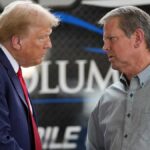- Home
- Billionaires
- Investing Newsletters
- 193CC 1000
- Article Layout 2
- Article Layout 3
- Article Layout 4
- Article Layout 5
- Article Layout 6
- Article Layout 7
- Article Layout 8
- Article Layout 9
- Article Layout 10
- Article Layout 11
- Article Layout 12
- Article Layout 13
- Article Layout 14
- Article Sidebar
- Post Format
- pages
- Archive Layouts
- Post Gallery
- Post Video Background
- Post Review
- Sponsored Post
- Leadership
- Business
- Money
- Small Business
- Innovation
- Shop
Recent Posts
Harris on Biden’s ‘Garbage’ Comment: ‘Respect Voter Choices’
Vice President Kamala Harris defended President Joe Biden’s controversial comments during a press briefing on Wednesday, emphasizing her disagreement with criticism directed at individuals based on their voting choices. When questioned about Biden’s statement on a call with Latino voters that was widely interpreted as branding supporters of former President Donald Trump as “garbage,” Harris tactfully sidestepped a direct response, focusing instead on the broader implications of political discourse.
Biden’s remarks, made during a Tuesday call, suggested that the real “garbage” lay with those who demonize Latino communities, a comment perceived as a thinly veiled jab at Trump and his supporters. Harris articulated that Biden had “clarified his comments,” referencing his assertion that the “only garbage I see floating out there” pertains to the demonization of Latino voters, which he deemed “unconscionable.”
A transcript released by the White House included a contentious punctuation that seemed to tie Biden’s comments to a joke made by comedian Tony Hinchcliffe, who referred to Puerto Rico as a “floating island of garbage” during a rally for Trump. This association sparked immediate backlash, with Trump’s campaign quick to seize the opportunity, asserting that Biden’s words insulted “tens of millions of Americans” and questioning whether Harris would apologize or disavow the remarks.
In response to inquiries about the potential electoral fallout from Biden’s comments, Harris did not provide a straightforward answer. Instead, she expressed respect for the challenges Americans face and stressed the need for unity, noting, “We all have so much more in common than what separates us.” This statement echoed a central theme of her campaign, which aims to bridge divides and address the concerns of everyday voters.
When pressed on whether she empathized with voters who felt insulted by Biden’s comments, Harris shifted the focus to her campaign activities, which included visits to three states where she planned to engage directly with constituents about pressing issues like rising grocery prices. This pivot underscores her commitment to addressing the practical concerns of voters rather than delving into the political controversies stemming from Biden’s comments.
The backlash against Biden’s remarks escalated as Trump’s campaign issued a formal statement condemning the president’s words. In an attempt to clarify the situation, Biden took to social media platform X, formerly Twitter, to explain that his comments were directed at Hinchcliffe’s “hateful rhetoric about Puerto Rico.” He insisted that his intention was solely to criticize the comedian’s comments, not to insult Trump supporters, stating, “That’s all I meant to say.” However, the damage was already done, and both sides of the political spectrum condemned Hinchcliffe’s joke, complicating the situation for Biden.
In an ironic twist, Trump, while responding to the controversy during a rally in North Carolina, claimed ignorance of Hinchcliffe, stating, “I have no idea who he is… and I don’t want to hear of him.” This distancing reflects Trump’s attempt to mitigate any backlash that might stem from his association with the controversial comedian, emphasizing that the real issue lies with Biden’s alleged disdain for American voters.
Trump’s rhetoric further fueled the controversy as he asserted that Biden and Harris are incapable of leading the nation if they harbor negative sentiments towards its citizens. “You can’t lead America if you don’t love Americans,” he declared, adding, “And you can’t be president if you hate the American people, and there’s a lot of hatred.” Trump’s assertion that his supporters represent “far higher quality than crooked Joe or lyin’ Kamala” highlights his strategy of portraying himself as the champion of the common American, in stark contrast to the perceived elitism of the Biden administration.
The controversy surrounding Biden’s remarks is part of a larger pattern of misstatements that have plagued his campaign in recent weeks. Just last week, during a campaign event in New Hampshire, Biden made headlines by declaring, “We got to lock him up,” in reference to Trump, before quickly clarifying that he meant “politically lock him up.” This slip was seized upon by Trump and his supporters, who labeled it as “election interference,” adding another layer of complexity to the ongoing political discourse.
As the election season intensifies, the implications of these remarks will undoubtedly resonate in the hearts and minds of voters across the country. Harris’s attempts to shift the narrative back to the issues at hand reflect a strategic effort to mitigate potential damage from Biden’s gaffe while simultaneously reinforcing her commitment to addressing the concerns of everyday Americans. Whether this approach will resonate with voters remains to be seen, as both campaigns prepare for a contentious and unpredictable electoral landscape.
In summary, Vice President Harris’s response to Biden’s comments highlights the delicate balancing act political leaders must perform in addressing controversy while maintaining focus on substantive issues. As Biden and Harris navigate the turbulent waters of public opinion and electoral challenges, their ability to connect with voters on shared concerns will be pivotal in the coming months. With tensions running high and the political climate increasingly polarized, the implications of Biden’s remarks and Harris’s subsequent defense could play a significant role in shaping the upcoming election.
Recent Posts
Categories
- 193cc Digital Assets2
- 5G1
- Aerospace & Defense43
- AI32
- Arts3
- Banking & Insurance11
- Big Data3
- Billionaires211
- Boats & Planes1
- Business299
- Careers13
- Cars & Bikes66
- CEO Network1
- CFO Network17
- CHRO Network1
- CIO Network1
- Cloud10
- CMO Network18
- Commercial Real Estate7
- Consultant1
- Consumer Tech150
- CxO1
- Cybersecurity48
- Dining1
- Diversity, Equity & Inclusion4
- Education7
- Energy8
- Enterprise Tech29
- Events11
- Fintech1
- Food & Drink2
- Franchises1
- Freelance1
- Future Of Work2
- Games132
- GIG1
- Healthcare74
- Hollywood & Entertainment152
- Houses1
- Innovation37
- Investing2
- Investing Newsletters4
- Leadership65
- Lifestyle10
- Manufacturing1
- Markets20
- Media180
- Mobile phone1
- Money13
- Personal Finance2
- Policy530
- Real Estate1
- Research6
- Retail1
- Retirement1
- Small Business1
- SportsMoney21
- Style & Beauty1
- Success Income1
- Taxes2
- Travel10
- Uncategorized6
- Vices1
- Watches & Jewelry2
- world's billionaires181
Related Articles
Harris and Trump Tied in Battlegrounds, Pennsylvania Key
In the race for the 2024 presidential election, a recent poll highlights...
By 193cc Agency CouncilOctober 31, 2024Vance’s ‘Fight or Flight’ Response to Trump on Rogan
In a recent appearance on Joe Rogan’s popular podcast, Senator JD Vance...
By 193cc Agency CouncilOctober 31, 2024Trump Denies Repeal of Obamacare Despite Past Actions
In a recent social media post, former President Donald Trump rebuffed claims...
By 193cc Agency CouncilOctober 31, 2024Trump Claims to Be Women’s ‘Protector,’ Harris Calls It ‘Offensive’
Former President Donald Trump made headlines again on Wednesday as he reiterated...
By 193cc Agency CouncilOctober 31, 2024















Leave a comment